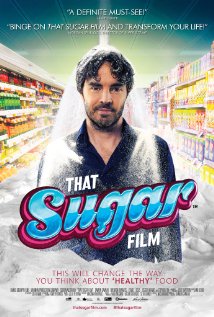“That sugar film” is a film about dangers of sugar, or at least advertised as one. Which may be an interesting topic, but the problem is that it is barely covered in this movie; instead, you get almost 97 minutes of bullshit, which makes you to suspect that it is actually a pro-sugar film, sponsored by sugar companies. Although, assuming that it is not the case, bad examples of pretty much anything can serve another purpose: it is much easier to see how they are trying to trick you when it is not performed professionally. Well, probably it also uses the tricks that are deemed too dumb to be used in professionally made movies, but still – that’s the interesting thing about this movie. It is like observing kids or savages, and then noticing similar behaviours in regular people.
So, the movie begins with a weird guy who complains that his girlfriend made him to abandon sugar, and now he wants to eat a lot of sugar for the sake of an experiment. His girlfriend is also pregnant, which makes it extra-disgusting, but supposedly it is an appeal to emotion – since it seems that some perverts like pregnant women. Or the director, who also played the protagonist, just wanted to get away in addition to eating sugar: like, “I’ll have a good time, which would involve a lot of sugar and some travel, while you suffer from pregnancy. But I’ll film it – so it will be a documentary film, which would make more people to eat grass – that’s what you want, right?”. Would probably be more fun to make such a movie about alcohol or meth.
The experiment itself is stupid and doesn’t really show much: the guy goes from nearly-zero to really high sugar consumption for two months, and observes how his body gets screwed; perhaps he is a fan of Jackass, but he was not nearly as fun.
Most of the movie is pretty boring: it is about him eating sugar, constantly repeating (ad nauseam) how bad sugar is (may remind of circular reasoning, but there is no reasoning – just an experiment) and how bad he feels (appeal to pity, perhaps; there also are scenes where he just feels bad), and eating more. By the end of the movie it is revealed that his body is indeed screwed, but not enough to win Darwin awards.
There was a whole one researcher in that documentary, a dialogue with whom went like this1:
— Hello. I’m experimenting with my body by eating a lot of sugar after avoiding it, and I feel bad. You tell us that sugar is not that harmful. How would you explain it?
— Hello. Well, pretty much anything is harmful if you consume too much of it, and especially if you are going from one extreme to another: your body gets used to…
— Stop right there, are you getting paid by Coca-Cola?
— Yes, but it does not affect the results, and they can not…
— Ah-ha! So you are working for them! I see now!
Can you tell which fallacy is that? Ergo decedo, a type of ad hominem, it seems. But the particularly weird thing is that the guy just comes to that researcher, most likely being aware that his research is sponsored by Coca-Cola (or whatever it was), and then invokes the said fallacy. At this point one may think that a lack of sugar makes people retarded (what would also be a fallacy; many jokes involve fallacies, by the way).
In the end the guy stops consuming sugar, and feels ruined – but from this he does not infer that a lack of sugar is harmful, as he did it with sugar two months ago, but does the opposite, of course. And concludes that — surprise! — sugar is bad. With such a methodology, it should be fairly simple to show that fruits and vegetables are extremely unhealthy – not to mention anything else.
Of course, one stupid movie does not imply that sugar is all nice and healthy, or anything serious at all; if you are interested in it, check the corresponding Wikipedia article and go through the links, or just search for it – it should not be hard to find some actual research results. Though the movie also suggests that research is unreliable, apparently implying that they are the only source of truth. And while it is possible, it also appears to be highly unlikely, and is the usual bullshit explanation of made-up things.
The sad part is that such poorly delivered information may have truth in it, but it is hard to tell when it is delivered in such a way; same goes for all the recreational drugs, and a lot of other things. When you see that information about something being harmful is a lie (or vastly exaggregated), it is hard to trust, and one may assume that the thing is in fact harmless. So, it is unclear from this film alone whether sugar is harmful in moderate portions, but the film itself seems to be rather harmful.
I won’t watch it again, and watched a while ago – so it is a rough paraphrasing from memory; the movie is there for you if you are really interested.↩

